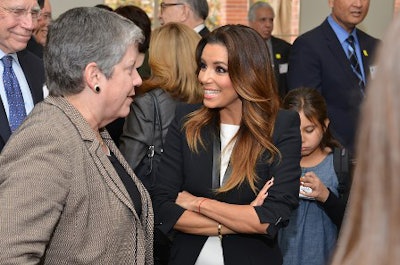A study released last week by University of California at Los Angeles researchers with support from actress Eva Longoria has put a high profile focus on the potential of U.S. Latinas for educational attainment and success.
 Actress and education advocate Eva Longoria, center, talks with Janet Napolitano, president of the University of California system. (Photo courtesy of UCLA)
Actress and education advocate Eva Longoria, center, talks with Janet Napolitano, president of the University of California system. (Photo courtesy of UCLA)Among the findings in “Making Education Work for Latinas in the U.S.,” a research report produced by the Civil Rights Project/Proyecto Derechos Civiles at UCLA’s Graduate School of Education and Information Studies, young Latinas who have Latina and male Latino teachers and counselors as role models and who are active in high school extracurricular activities have a much better chance of educational success. In addition to the study, the researchers produced a companion video that features Longoria and young Latinas whose life stories are documented in the study.
Longoria, who commissioned and financed the study through the Eva Longoria Foundation, said the findings will enable her organization to “fine-tune” its education work and advocacy. In addition, “We hope others will use this research to support Latina achievement,” she said in a statement. The foundation was founded “to empower Latinas to reach their potential through education and entrepreneurship,” according to the organization.
In completing the study, Civil Rights Project researchers conducted an extensive literature search on research that had relevant findings. They explored two large datasets, one national and one California-based, to identify “predictors of successful educational outcomes for representative samples of Latina youth who have recently been in high school and college.” In addition, the study included the case studies of seven young Latinas from tough circumstances who navigated their way to educational success through high school, community college and four-year universities.
“We found some things that surprised us a bit and, in other cases, affirmed that what we suspected might have been important for these young women actually were,” says Dr. Patricia Gándara, a UCLA professor of education and co-director of the Civil Rights Project.
For example, she says, “Young [Latinas] seem to be particularly affected by having Latino teachers in their schools.
“We didn’t have the same findings for the young men, and of course, we don’t find that for other groups. But for the young women there does seem to be a connection between having more Latino teachers and going on to college,” explains Gándara, who was the study’s principal investigator.
The study also determined that a strong belief by Latino parents that their daughters will complete high school was associated with increased high school graduation and college attendance rates among Latinas. In addition, being bilingual and having excellent math scores in elementary school were positive gauges of Latina college-going success.
“When we look at [the Education Longitudinal Study] data … we find for young women [and young men] that being bilingual, not losing the primary language, is also associated with going on to college. That surprised us,” Gándara says.
Among other findings, the study found that for Latinas participation in extracurricular activities contributes to a sense of belonging at school, which may contribute to them viewing college as an attractive goal.
With the study’s release last week, Dr. Marcelo M. Suárez-Orozco, dean of the UCLA Graduate School of Education and Information Studies, led a panel discussion on campus that included Longoria and Gándara, along with University of California president Janet Napolitano and Antonia Hernandez, president and CEO of the California Community Foundation.
In recent years, Longoria, who is best known to U.S. television viewers as the actress who played Gabrielle Solis in the “Desperate Housewives” comedy-drama series from 2004 to 2012, has gained attention as a philanthropist and social activist. Earlier this year, Longoria received her master’s degree in Chicano Studies from California State University, Northridge.
“[Longoria is] a pretty impressive woman … she cares very deeply about education,” Gándara says.
She notes that the Civil Rights Project is pursuing further research around potential policy ideas stemming from the study. “There are a number of findings that are so ripe for policy,” she says.
“We know that we have very few young Latinas who go into math and science, and yet [early experiences with math] seem to be a real big predictor for these young women making it into college,” Gándara says. “The study was very useful to us in thinking about policy alternatives for increasing the participation and college graduation rates for Latinas and Latinos.”


















